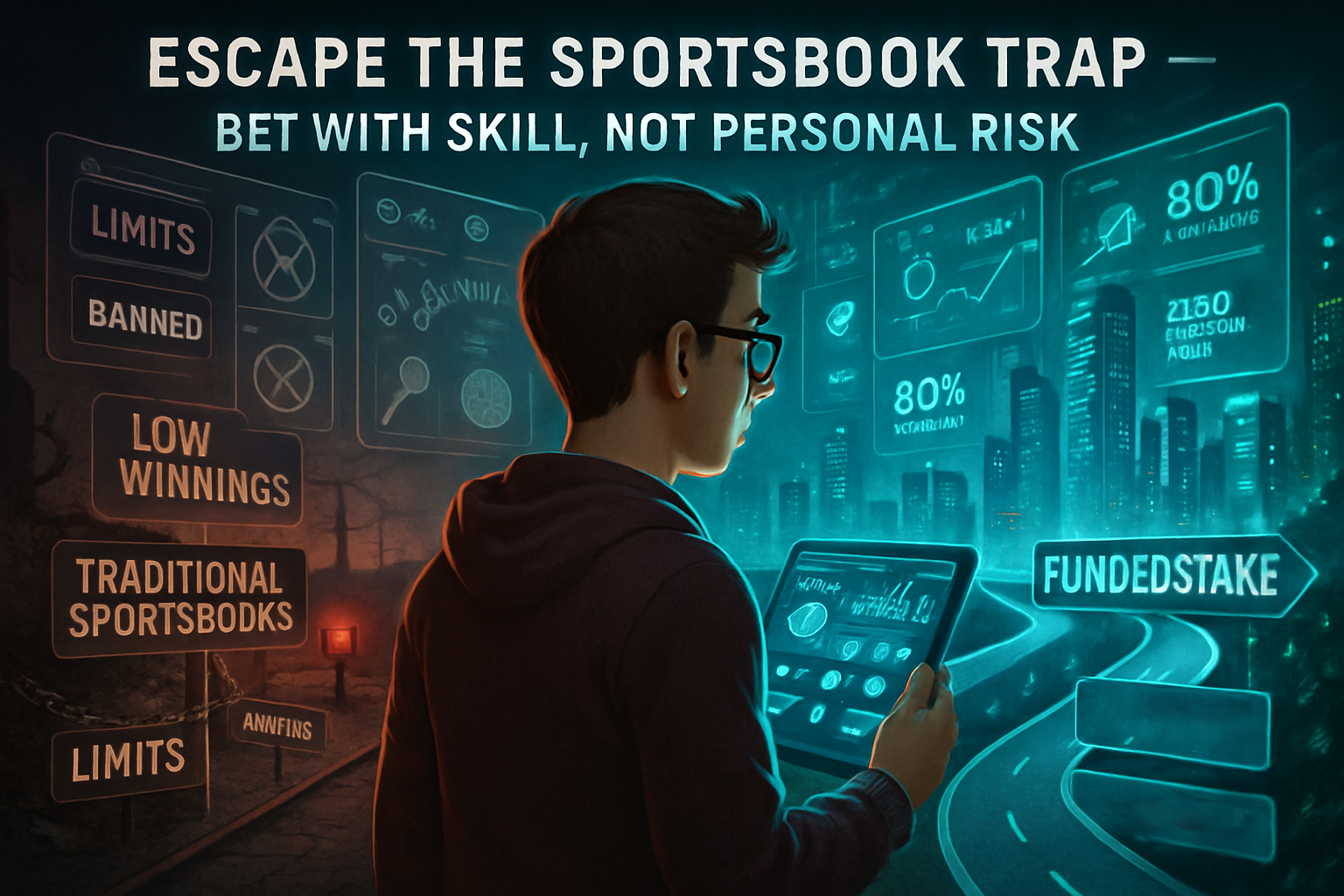Confidence can make or break your sports betting decisions. The right balance – known as "calibrated confidence" – helps you stay logical, stick to strategies, and manage risks. But too much confidence can lead to emotional decisions, chasing losses, and ignoring critical data.
Key Takeaways:
- Balanced Confidence Helps: Trust your research, manage your bankroll, and stay disciplined.
- Overconfidence Hurts: Leads to risky bets, ignoring facts, and financial losses.
- Emotions Matter: Excitement, frustration, and fear can cloud judgment – stay aware.
- Mental Traps to Avoid: Gambler’s fallacy, confirmation bias, and sunk cost fallacy.
Quick Tips for Better Betting:
- Track Performance: Keep detailed records of wins, losses, and strategies.
- Set Rules: Use clear betting limits to avoid impulsive decisions.
- Practice Safely: Platforms like Funded Stake let you practice with virtual money before risking your own.
Confidence isn’t about luck or gut feelings – it’s about preparation, discipline, and learning from experience. Start small, stay consistent, and build your skills step by step.
Sports betting to win – Betting psychology – Steve Ward – Book …
How Confidence Shapes Betting Choices
Confidence plays a big role in how people make decisions, assess risks, and approach outcomes in sports betting. Like any strategy, finding the right balance is crucial.
Let’s break down how balanced confidence can lead to smarter betting choices.
Why Balanced Confidence Matters
Having the right amount of confidence helps bettors make informed decisions based on solid research. When confidence comes from understanding and preparation, it supports smarter, more sustainable betting habits.
Here’s what balanced confidence brings to the table:
- Clear Decision-Making: Confident bettors trust their research, focus on facts, and avoid emotional decisions.
- Better Bankroll Management: They stick to their betting limits and avoid reckless spending.
- Handling Losses Gracefully: They accept losses without chasing after them impulsively.
- Consistent Strategy: Confidence helps bettors stick to proven methods without second-guessing themselves.
The Dangers of Overconfidence
Overconfidence happens when belief in one’s skills outweighs actual ability, often leading to mistakes and financial setbacks.
Here are some common signs of overconfidence and their consequences:
| Behavior | Risk | Impact |
|---|---|---|
| Betting more after a win | Overestimating skill | Drains bankroll quickly |
| Ignoring opposing evidence | Confirmation bias | Overlooks critical red flags |
| Skipping research | Trusting gut feelings | Leads to uninformed bets |
| Breaking bankroll rules | Taking bigger risks | Increased financial exposure |
To keep confidence in check, successful bettors often:
- Track Their Bets: Keep detailed records of decisions and results.
- Analyze Their Performance: Look at wins and losses to spot trends and improve.
- Set Firm Limits: Stick to clear rules about how much to risk.
- Use Feedback Tools: Leverage platforms that offer insights and performance reviews.
True confidence comes from skill, preparation, and consistent results – not from luck or hunches. By understanding these risks, you’ll be better prepared to refine your betting strategy in the next steps.
Mind and Behavior in Betting
Understanding how emotions and mental patterns influence betting decisions is key to maintaining steady confidence. This section dives into the psychological factors at play and provides practical tips to stay mentally sharp.
Managing Your Emotions
Strong emotions can cloud judgment, leading to poor betting decisions. Here’s how various emotional states can affect your choices and what you can do about it:
| Emotion | Impact on Betting | Management Strategy |
|---|---|---|
| Excitement | Riskier bets | Set strict bet limits before games |
| Frustration | Chasing losses, breaking rules | Take mandatory cooling-off periods |
| Fear | Hesitation, missed opportunities | Focus on pre-planned strategies |
| Overconfidence | Ignoring warning signs | Review past performance data |
To keep your emotions in check while betting:
- Set Time Limits: Take a 30-minute break after significant wins or losses.
- Use Checklists: Create a pre-bet checklist to ensure your decisions are logical.
- Track Your Mood: Write down your emotional state alongside bet outcomes to identify patterns.
- Practice Mindfulness: Use quick mindfulness techniques, like deep breathing, to center yourself before placing bets.
Managing emotions is only part of the equation. Avoiding common cognitive mistakes is just as important.
Common Mental Traps
Bettors often fall into predictable thinking patterns that can hurt their success. Recognizing these traps is the first step to avoiding them:
- The Gambler’s Fallacy: Believing that past outcomes affect future results. For example, assuming a team is "due for a win" after several losses, even when there’s no statistical reason for it.
- Confirmation Bias: Focusing only on information that supports your beliefs while ignoring contradictory evidence. This can lead to overlooking crucial details that might prevent losses.
- Sunk Cost Fallacy: Continuing to bet on losing positions because of previous investments. This often happens when trying to recover losses by increasing stake sizes.
Here’s how to guard against these mental traps:
1. Challenge Your Assumptions
Always question your initial reactions. Ask yourself, "What evidence goes against my current thinking?" This habit can save you from costly errors.
2. Rely on Data, Not Gut Feelings
Base your decisions on solid statistics instead of instincts. Keep track of metrics like:
- Win/loss ratios
- Return on investment (ROI)
- Average stake size
- Profit/loss by bet type
3. Set Circuit Breakers
Establish rules that force you to stop betting under specific conditions:
- After three consecutive losses
- If you hit 50% of your daily loss limit
- When you deviate from your planned stake sizes
sbb-itb-6ef1185
Building the Right Level of Confidence
Effective betting confidence comes from thorough research, clear rules, and mental preparation. Here’s how to refine your approach and build a strong foundation.
Research and Knowledge
Concentrate on one sport or league to develop in-depth expertise. Focus on these key areas:
- Statistical Analysis: Dive into team performance metrics, head-to-head records, and emerging patterns.
- Player Conditions: Stay updated on injuries, roster changes, and performance shifts.
- External Factors: Factor in weather, travel schedules, and venue conditions.
Create a consistent routine:
- Daily: Check sports news and injury updates.
- Weekly: Review team statistics and trends.
- Monthly: Assess your betting performance to identify areas for improvement.
Setting Rules and Limits
Once your research is solid, establish rules to protect your bankroll. For example, if you’re working with a $1,000 account, consider these guidelines:
| Rule Type | Example | Purpose |
|---|---|---|
| Minimum Bet | $10 per bet | Prevents spreading your bankroll too thin. |
| Maximum Bet | $100 per bet | Limits risk on any single wager. |
| Daily Loss Limit | $150 | Stops you from chasing losses. |
| Overall Loss Limit | $200 | Keeps your betting sustainable. |
| Profit Target | $330 | Provides a clear success goal. |
These rules encourage disciplined betting habits. Regularly review and adjust them based on your performance.
Mental Training Methods
Strengthen your mindset with these techniques:
- Performance Journaling: Track your decisions, results, and thoughts after each bet. Look for patterns and learn from mistakes.
- Simulation Practice: Test strategies without financial risk using tools like Funded Stake.
- Skill Development Framework: Start with smaller bets, gradually increase as you improve, and keep detailed performance records. Set monthly growth targets to stay on track.
How Funded Stake Supports Confidence Growth

Developing balanced confidence is crucial, and Funded Stake offers a controlled space to help you achieve it. This phase builds on earlier strategies by providing a safe place to refine your betting skills without financial risk.
Practice Without Financial Risk
Funded Stake uses virtual capital to let you practice betting without putting your own money on the line. Practice accounts come with strict limits, ranging from $1,000 to $100,000, and follow fixed parameters:
| Account Size | Min/Max Bet Range | Daily Loss Limit | Profit Target |
|---|---|---|---|
| $1,000 | $10-$100 | $150 | $330 |
| $5,000 | $50-$500 | $750 | $1,650 |
| $10,000 | $100-$1,000 | $1,500 | $3,300 |
These limits encourage disciplined betting habits. With a 4.9/5 Trustpilot rating, the platform has proven to be a reliable space for practice.
Sharpening Your Betting Skills
To make the most of this phase, follow these key requirements:
- Minimum Activity: Complete at least 25 picks within 30 days.
- Risk Management: Stick to the maximum loss limits.
- Goal Setting: Aim for the defined profit targets.
- Multi-Sport Practice: Engage in betting across sports like basketball, soccer, hockey, and MMA.
This structured method has led to the creation of over 50 funded accounts, helping bettors develop consistent, well-thought-out strategies through analysis and discipline. Once you’re confident in this risk-free environment, you’re ready to move on to real-money betting.
Transitioning to Real Money Betting
After succeeding in virtual practice, Funded Stake helps you smoothly transition to betting with real money. The steps include:
- Verification Phase: Prove consistent performance.
- Professional Setup: Complete KYC verification to get started.
- Profit Sharing: Keep 80% of the profits you generate.
- Regular Payouts: Withdraw your earnings bi-weekly.
The platform has already distributed over $100,000 in funding, reinforcing its dedication to supporting skilled bettors.
Conclusion: Finding the Right Confidence Balance
Key Takeaways
Successful betting requires a mix of skill and emotional control. It’s not about following gut feelings but making calculated decisions based on solid analysis. Building a structured approach that combines knowledge and discipline is the way forward.
Here’s how balanced confidence can help:
- Focus on analysis over emotions: Avoid emotional decision-making by sticking to data and research.
- Stay consistent: Keep your betting approach steady, no matter the outcome.
- Respect your limits: Work within your pre-set risk management rules.
- Know when to pause: Step back and reassess when needed to avoid impulsive mistakes.
The foundation of effective betting lies in disciplined research and setting clear boundaries. With these principles in place, the next step is practicing in a controlled, low-risk environment.
Steps to Build Confidence in Betting
To develop balanced confidence, start practicing in a safe setting. Funded Stake offers a $1,000 challenge account that allows you to hone your skills without significant financial risk. Here’s how it works:
- Start Small: For $49.99, you get a $1,000 challenge account to test strategies with minimal risk.
- Grow Gradually: Progress to larger accounts as your skills improve, each featuring a 33% profit goal and corresponding risk limits.
- Prove Your Skills: Complete at least 25 picks within 30 days to showcase consistency.
Practicing in this structured environment helps you build confidence step by step. By tracking your progress and refining your strategies, you can prepare for real-money betting without unnecessary pressure.



